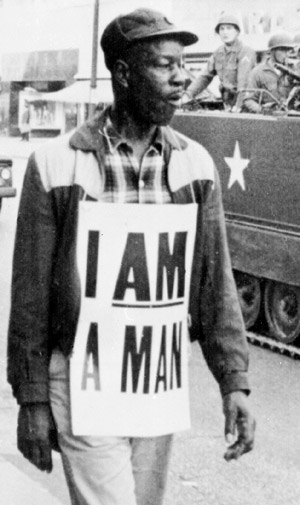






| At
the River I Stand
Memphis's 1300 sanitation workers formed the lowest caste of a deeply racist society, earning so little they qualified for welfare. In the film, retired workers recall the fear as they took on the entire white power structure when they struck for higher wages and union recognition. But local civil rights leaders and the black community soon realized the strike was a struggle for economic justice for all African Americans. Stirring historical footage shows the community mobilizing behind the strikers, organizing mass demonstrations and an Easter boycott of downtown businesses. The national leadership of AFSCME put the international union's full resources behind the strike. One day a placard appeared on the picket lines which in its radical simplicity summed up the meaning of the strike: "I am a man." In March, Martin Luther King came to Memphis as part of his "Poor People's Campaign" to expand the civil rights agenda to the economy. The film recreates the controversies between King's advisors, local leaders, and younger militants which led to open conflict. When young hotheads turned King's protest march into a violent confrontation with the brutal Memphis policy, King left the march. King and the nation realized his leadership and his non-violent strategy had been threatened. King felt obliged to return to Memphis to complete a nonviolent march despite the by-now feverish racial tensions. The film recaptures the driving sense of foreboding as King delivered his final "I have been to the mountain-top" speech. The next day, April 4. 1968, he was assassinated. Four days later, thousands from Memphis and around the country rallied to pull-off King's nonviolent march. The city council crumbled, and granted most of the strikers' demands. 1300 sanitation workers had shown they could successfully challenge the entrenched economic structure of the South. The fires of Los
Angeles, endemic inner city unemployment and the growing disparity between
rich and poor make clear that the issues Martin Luther King raised in
his last days have yet to be addressed. At the River I Stand
succeeds in showing that the causes (and possibly the solutions) to
our present racial quandary may well be found in what happened in Memphis.
Its riveting portrait of the grit and determination of ordinary people
will inspire viewers to rededicate themselves to racial and economic
justice. |
1994 Erik Barnouw
Award for Best Documentary, Organization of American Historians "An excellent
film on the movement which drew Martin Luther King to Memphis and his
death. It reveals how the black and labor movements both win by struggling
together!" "The struggle
and triumph of dignity over injustice is the luminous tapestry of all
great social movements. At the River I Stand is an inspiring
visual testament and a call to witness to every viewer." "Has all the
impact of Eyes on the Prize. It would seem almost inconceivable
not to acquire this video. Beautifully conceived, produced and presented." "An eloquent
and powerful work of history...offering new insight into the intersection
of race and class."
Video
Purchase: $195 |
 Memphis,
Spring 1968 marked the dramatic climax of the Civil Rights movement.
At the River I Stand skillfully reconstructs the two eventful
months which transformed a local labor dispute into a national conflagration,
disentangling the complex historical forces which came together with
the inevitability of tragedy in the death of Dr. Martin Luther King
Jr. The 58 minute documentary brings into sharp relief issues which
have only become more urgent in the intervening years: the connection
between economic and civil rights, the debate over violent vs. nonviolent
change, and the demand for full inclusion of African Americans in American
life.
Memphis,
Spring 1968 marked the dramatic climax of the Civil Rights movement.
At the River I Stand skillfully reconstructs the two eventful
months which transformed a local labor dispute into a national conflagration,
disentangling the complex historical forces which came together with
the inevitability of tragedy in the death of Dr. Martin Luther King
Jr. The 58 minute documentary brings into sharp relief issues which
have only become more urgent in the intervening years: the connection
between economic and civil rights, the debate over violent vs. nonviolent
change, and the demand for full inclusion of African Americans in American
life.